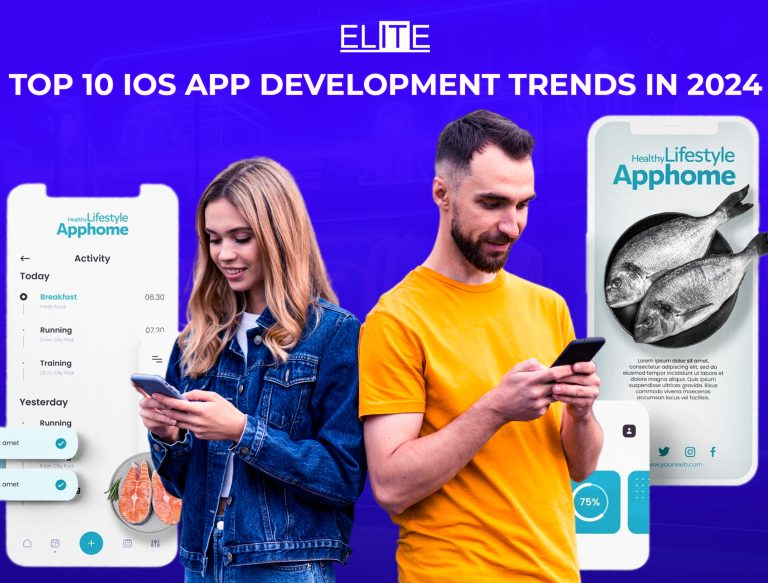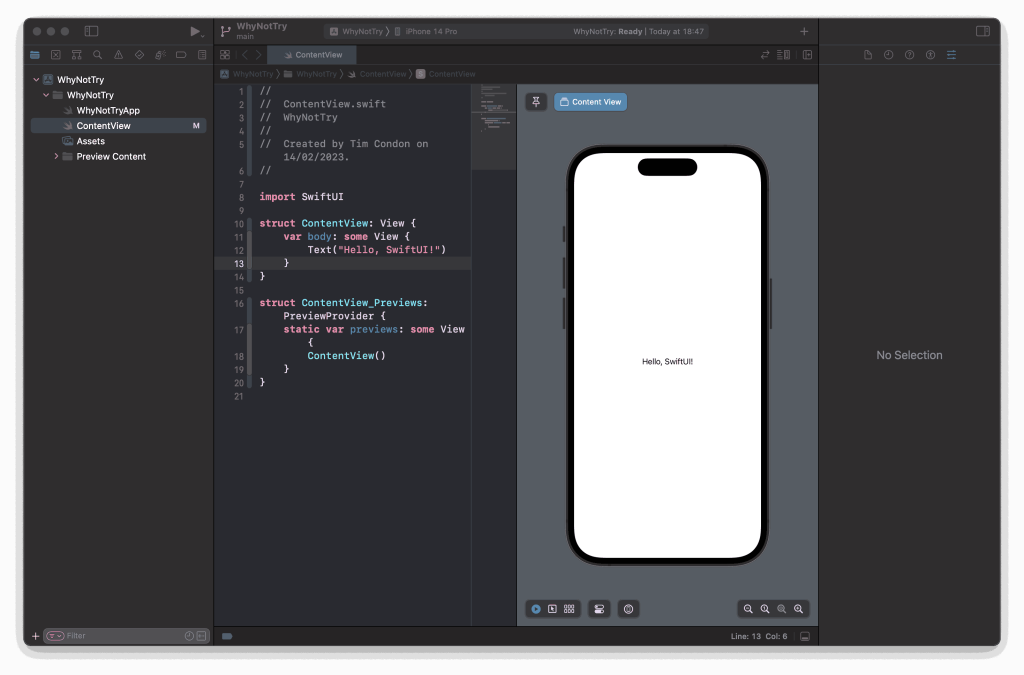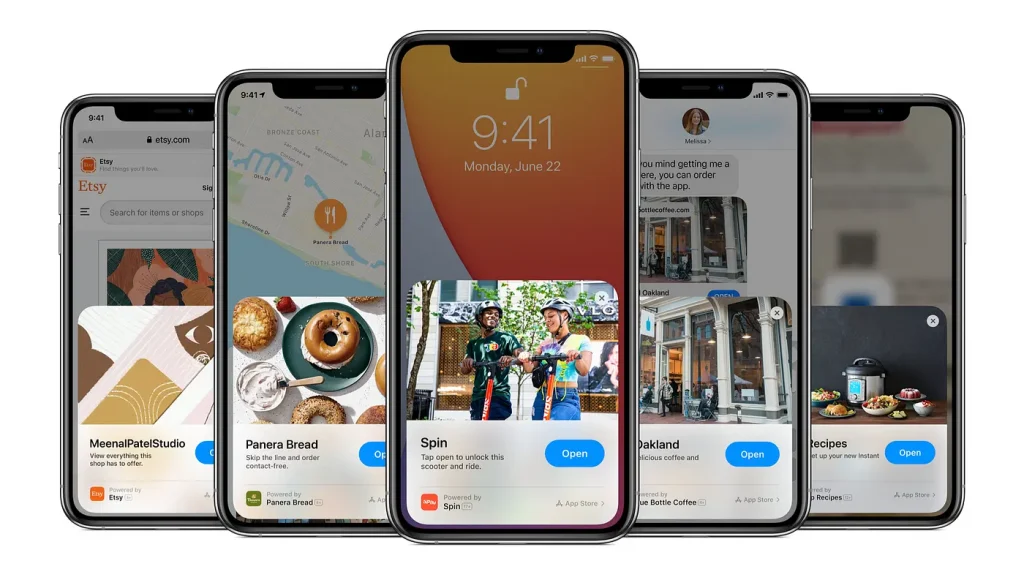Technology is advancing at an unprecedented pace. What was once a futuristic concept is now a tangible reality. The mobile app industry, in particular, has witnessed a surge, with iOS apps holding a significant market share. Statistics show that on average 1278 apps are released on the App store daily, emphasising the platform’s dominance. To stay ahead of the curve and deliver exceptional user experiences, businesses and developers must keep abreast of the latest iOS app development trends.
Elite IT understands the critical role of staying updated with the evolving tech landscape. Our expert app development services are available to help you utilise the full potential of these trends, creating innovative and high-performing iOS applications.
In this blog, we will delve into the top 8 iOS app development trends shaping the industry in 2024. Get ready to discover how these trends can transform your app development strategy and drive business growth.
What are the Top iOS App Development Trends of 2024?
The landscape of iOS app development is constantly evolving, with new technologies and user preferences emerging rapidly. To stay competitive, businesses and developers must closely monitor the top iOS app development trends of 2024. Let’s explore these trends in detail.
Machine learning & Artificial Intelligence (MI &AI):
AI and ML are rapidly transforming the iOS app development landscape. These technologies offer unlimited opportunities to enhance user experiences, optimise app performance, and unlock new possibilities. By incorporating AI and ML into iOS apps, developers can create intelligent virtual assistants, personalised recommendations, advanced image and speech recognition, and predictive analytics.
Looking ahead, the iOS development future promises even more groundbreaking innovations fueled by AI and ML. We can anticipate hyper-personalised experiences for individual user preferences, and autonomous app features that learn and adapt over time. As these technologies continue to mature, developers who master their integration will be at the forefront of creating the next generation of iOS apps, further highlighting the importance of mobile apps in delivering cutting-edge solutions that cater to evolving user expectations.
Augmented Reality & Virtual Reality Integration:
AR and VR have rapidly evolved from niche technologies to mainstream platforms, captivating users with immersive experiences. By integrating AR and VR into iOS apps, developers can create engaging and interactive experiences that blur the lines between the physical and digital worlds. From gaming and entertainment to education and e-commerce, the applications are vast.
Imagine trying on clothes virtually, exploring historical landmarks through AR, or engaging in interactive training simulations. The future of iOS app development is significantly linked to AR and VR. As hardware continues to improve and become more accessible, we can expect to see even more sophisticated and immersive AR and VR experiences.
IoT and HomeKit:
The convergence of IoT and mobile devices has ushered in a new era of connected living, and iOS is at the forefront of this revolution. HomeKit, Apple’s smart home platform, seamlessly integrates IoT devices with iOS apps, providing users with unparalleled control and convenience. These technologies empower users to create personalised and efficient living spaces.
The benefits of emerging technologies in 2024 are evident in the IoT and HomeKit domain. Developers can capitalise on this trend by creating innovative apps that manage smart homes, automate tasks, and enhance user experiences. As the IoT ecosystem expands, there will be increasing opportunities for developers to create innovative solutions that improve people’s lives.
Cloud Integration:
Cloud integration has become an important component of modern mobile app development. It offers a scalable, flexible, and cost-effective infrastructure for storing, processing, and managing app data. By using cloud services, developers can create robust, feature-rich iOS apps without the burden of managing complex on-premises infrastructure. This trend is rapidly gaining momentum, shaping the future of mobile app development.
As one of the top iOS app development trends, cloud integration empowers developers to build apps that can handle increasing user loads, deliver seamless user experiences, and access a vast array of cloud-based services. With real-time data synchronisation, the benefits of cloud integration for your business can be unlimited which makes it the backbone of innovative app development to meet the demands of today’s connected world.
Cross Platform Development:
Cross-platform development offers a compelling alternative to native app development. By enabling developers to create applications that function seamlessly across multiple platforms, including iOS and Android, cross-platform development significantly reduces development time and costs. This approach has gained immense popularity due to its efficiency and ability to reach a wider audience with a single codebase.
As one of the top iOS app development trends in 2024, the native vs cross-platform app development debate continues to evolve. Cross-platform development empowers businesses to accelerate time-to-market and allocate resources more effectively. With continuous advancements in technology, cross-platform development is set to become an even more viable option for businesses seeking to deliver exceptional mobile experiences across different platforms.
AI Chatbots and Voice-Enabled Apps:
AI chatbots and voice-enabled apps are rapidly transforming the landscape of iOS mobile app development. These technologies offer a more intuitive and engaging way for users to interact with applications. In line with mobile application trends, businesses are increasingly incorporating AI chatbots to provide instant customer support, answer frequently asked questions, and even guide users through complex processes. Voice-enabled apps, on the other hand, offer hands-free convenience, allowing users to perform tasks and access information effortlessly.
The integration of AI chatbots and voice-enabled apps into iOS apps presents a significant opportunity to enhance user experience and drive customer satisfaction. By understanding user preferences and behaviour through AI-powered analytics, businesses can tailor their offerings and messaging to specific customer segments, leading to higher conversion rates.
Integrations of High Level Security:
In today’s digital landscape, security is very important for iOS mobile app development. With the increasing prevalence of cyber security risks for businesses, safeguarding user data and protecting app integrity is essential. By implementing advanced encryption techniques, secure authentication protocols, and regular security audits, developers can build trust with users and mitigate risks.
As one of the 2024 iOS App Trends, prioritising security is crucial for the success of any mobile application. By staying ahead of evolving threats and adhering to industry best practices, developers can protect sensitive information, maintain user confidence, and build a strong reputation for their apps.
Wearable App Functionality:
Wearable devices, such as smartwatches and fitness trackers, have become an integral part of many people’s lives. As one of the prominent ios app development trends, integrating wearable app functionality can significantly enhance user engagement. By developing companion apps for wearables, businesses can offer users quick access to essential information, notifications, and controls right from their wrists.
From fitness tracking and health monitoring to payment solutions and smart home control, the possibilities are vast. Wearable apps can provide real-time data, personalised insights, and convenient interactions, ultimately creating a more seamless and connected user experience.
SwiftUI Adoption:
SwiftUI, Apple’s declarative framework for building user interfaces, has transformed iOS app development. It offers a streamlined and intuitive approach to creating visually appealing and responsive apps. With its declarative syntax, developers can focus on defining the desired UI rather than the underlying implementation details, leading to faster development cycles and reduced code complexity.
As The Future Of iOS App Development, SwiftUI empowers developers to build cross-platform applications that work seamlessly across iOS, macOS, watchOS, and tvOS. This unified development experience saves time and resources while ensuring consistency across different platforms.
More Focus on User Experience Design:
In the competitive landscape of ios mobile app development, delivering exceptional user experiences is necessary. Users expect intuitive, engaging, and seamless interactions with apps. By prioritising user experience design, developers can create apps that not only meet user needs but exceed expectations. This involves conducting thorough user research, understanding user behaviours, and designing interfaces that are both visually appealing and easy to navigate.
A well-designed user experience can significantly impact user satisfaction, retention, and app store ratings. By investing in user experience research and testing, developers can identify pain points, iterate on designs, and ultimately create apps that delight users. A focus on user experience is not just about aesthetics; it’s about creating meaningful connections between users and the app.
Integration of 5G Technology:
The rollout of 5G technology has transformed the iOS ecosystem, offering significant advancements in 5G connectivity and data speeds that are redefining how users interact with their devices. With low latency and enhanced network capacity, iOS apps can now support a range of immersive applications, from augmented reality experiences to high-definition video streaming without buffering issues.
Additionally, cloud-based gaming has surged in popularity, allowing users to enjoy console-quality games with real-time interactions via edge computing. The seamless integration of 5G compatibility on iPhones ensures that users can tap into these cutting-edge technologies, enhancing their digital experiences like never before.
App Clips and Mini-Apps:
With the rise of App Clips and mini-apps, iOS users can now enjoy quick, instant apps without the need to fully download them. These lightweight applications, triggered through NFC tags, QR codes, or simple links, provide limited functionality to streamline tasks such as booking a parking spot via ParkWhiz or ordering food.
By focusing on user convenience and saving valuable memory space, App Clips are designed to encourage swift conversion without bogging down your device with unnecessary files. This approach not only speeds up interactions but also offers an efficient, on-the-go experience.
Blockchain Integration:
Blockchain technology is making waves in the iOS ecosystem, with its potential to enhance security, transparency, and efficiency in various applications. From secure digital payments to tamper-proof data sharing, blockchain integration offers a decentralised approach to handling sensitive information. iOS developers are tapping into this trend to build secure apps for industries like finance, healthcare, and supply chain management, ensuring that data remains encrypted and trustworthy.
With blockchain, users can also benefit from smart contracts, which automate agreements and ensure trust without intermediaries. As blockchain continues to evolve, its integration into iOS apps promises to reshape the way users interact with digital services, offering new layers of reliability and security.
Subscription-Based Monetization:
The shift toward subscription-based monetization has become a dominant trend in iOS app development, providing developers with a steady revenue stream while offering users continuous value. Instead of one-time purchases, apps now focus on recurring subscriptions, which can range from premium content access to enhanced features in productivity tools or entertainment platforms.
This model benefits both developers and users, as it allows apps to continuously improve and provide regular updates. Additionally, it encourages customer retention, as users are more likely to stay engaged with apps they’ve subscribed to. With various subscription tiers and trials, developers can appeal to a wide range of users while optimising for long-term conversion and growth.
Progressive Web Apps (PWAs):
Progressive Web Apps (PWAs) are gaining traction as a versatile solution for developers looking to bridge the gap between mobile websites and native apps. PWAs offer the best of both worlds—allowing users to access app-like experiences directly through their browsers without downloading anything. These apps provide offline functionality, faster load times, and seamless updates, ensuring user convenience and accessibility.
With evolving technology, understanding the differences between Flutter vs React Native can also be helpful when considering cross-platform approaches like PWAs, as each has unique strengths for different project needs. iOS support for PWAs has been improving, enabling better integration with system features like push notifications and home screen shortcuts. For businesses, PWAs present a cost-effective alternative to developing separate native apps, while still offering a responsive, app-like experience that can boost engagement and reach a broader audience.
What is the Future of iOS Mobile Application Development?
The future of iOS mobile app development is a dynamic and exciting space where creativity and technological advancements will continue to shape the way we interact with our devices. As technology continues its relentless march forward, we can anticipate a landscape where apps become even more intelligent, personalized, and immersive.
The convergence of AI, AR, and VR will open up new frontiers, allowing developers to create truly groundbreaking experiences. Additionally, the increasing importance of privacy and security will drive the development of robust and trustworthy applications. Moreover, as 5G networks become more widespread, we can expect to see a surge in real-time applications and augmented reality experiences. For those considering cross-platform solutions, it’s worthwhile to explore the pros and cons of Flutter to see how it might fit into future iOS development strategies.
Final Words:
The world of iOS app development is in a state of constant evolution, with new trends emerging at a rapid pace. To stay ahead of the competition, businesses and developers must closely monitor the ios app development trends shaping the industry. From the integration of AI and ML to the rise of AR and VR, the possibilities are endless. By embracing these trends and focusing on user experience, developers can create innovative and successful iOS applications.
As technology continues to advance, the future of iOS app development holds immense promise. By understanding the key trends of all emerging technologies, businesses can position themselves for growth and success in the dynamic mobile app market.
Table of Contents
Frequently Asked Questions:
The latest technologies driving iOS development include SwiftUI for streamlined UI creation, ARKit for immersive augmented reality experiences, and advanced machine learning frameworks for intelligent app features. Cloud integration, IoT connectivity, and a strong focus on user experience design are also key trends shaping the future of iOS app development.
Following iOS app development trends is crucial for staying competitive and creating successful apps. It ensures your app aligns with user expectations, leverages the latest technologies, and provides a superior user experience. Staying updated also helps you identify emerging opportunities and potential challenges, allowing you to adapt and innovate effectively.
iOS app development is evolving rapidly. Key trends include SwiftUI, ARKit, machine learning, WidgetKit, and Combine. Developers should stay updated on these to create innovative and engaging apps.
Swift is the recommended language for iOS app development. It’s a modern, powerful, and easy-to-learn language designed specifically for Apple platforms.

Zara Finch
Zara, an experienced professional in the SEO industry for the past two years, is passionate about discussing technology, innovations, and the ever-evolving digital landscape. With a keen interest in exploring the latest trends and developments, she brings valuable insights and expertise to her work.
















